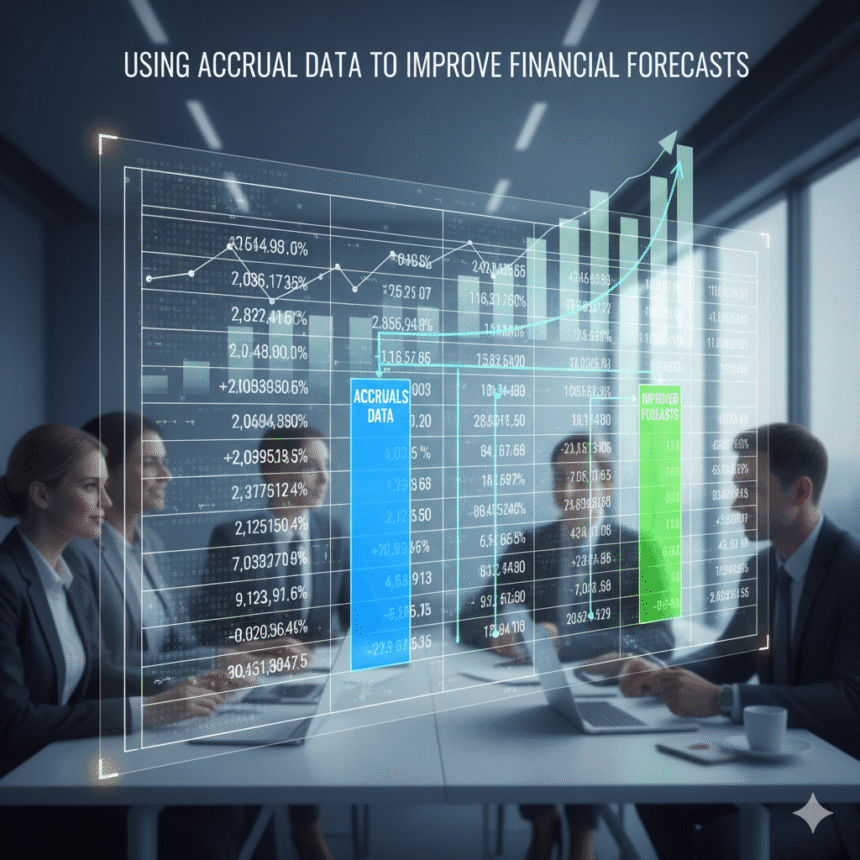Forecasting is one of the most critical responsibilities of any financial team. It helps businesses anticipate future cash flows, prepare for risks, and make strategic investments. But accurate forecasting doesn’t just happen, it depends on the quality of the data that feeds into it. That’s where accrual accounting steps in.
Accrual data provides a clearer, more realistic picture of a company’s financial health. By recognizing income and expenses when they are earned or incurred (rather than when cash changes hands), financial teams can forecast with greater precision.
Why Accrual Data Matters
Cash accounting may seem simpler, but it can distort reality. A company might appear flush with cash in one month and struggling the next, even if its long-term financial health is stable. Accrual data smooths out those fluctuations by matching revenues and expenses to the periods they actually belong to.
According to Deloitte, 82% of businesses cite inaccurate forecasting as a significant challenge, and much of this inaccuracy stems from relying on incomplete data. Accrual accounting reduces this risk by providing a more consistent foundation.
Tracking Expenses the Smart Way
One of the building blocks of accrual data is how expenses are tracked. Instead of waiting until cash leaves the account, financial teams record costs when they’re incurred. This might mean logging an accrued expense journal entry to recognize a liability for services already received but not yet paid.
Doing so ensures that expenses line up with the revenues they help generate, making forecasts far more reliable.
Benefits of Accrual Data in Forecasting
When used effectively, accrual accounting strengthens forecasting in several ways:
- Consistency: Expenses and revenues align with the right reporting periods.
- Clarity: Teams gain a better view of true profitability.
- Trend analysis: Forecasts rely on normalized data rather than cash flow spikes.
- Risk management: Potential gaps in revenue and expenses are easier to spot.
- Long-term accuracy: Growth projections become more realistic.
This structured approach allows leaders to make informed decisions about hiring, investments, or scaling back, with fewer surprises along the way.
Building Forecasting Models With Accrual Data
Once accrual data is in place, financial teams can build forecasting models that reflect real-world operations. For example, they can project recurring expenses like rent or payroll alongside revenues from long-term contracts. This creates rolling forecasts that adjust dynamically, rather than static predictions that quickly become outdated.
Accrual-based models also make it easier to run “what-if” scenarios. Want to know how launching a new product or expanding into a different region might impact cash flow? With accrual data, the assumptions can be modeled more accurately. Tying forecasting exercises to real business outcomes ensures financial teams aren’t just reporting but actively shaping strategy.
Real-World Applications
Accrual data supports better forecasting in a range of business situations:
- Seasonal businesses can anticipate off-peak expenses while still tracking annual revenue accurately.
- Subscription-based companies can recognize recurring income monthly rather than in lump sums.
- Project-driven firms can match expenses like labor and materials to project milestones.
These scenarios show why accrual isn’t just an accounting formality, it’s a powerful tool for planning.
Balancing Accrual With Communication
Of course, even the most accurate accrual data needs to be communicated effectively. Financial teams must translate complex journal entries, liabilities, and forecasts into actionable insights for leadership. That means distilling the numbers into narratives which are stories about where the business is headed and why.
When finance becomes a storytelling partner rather than just a reporting function, forecasts turn into roadmaps for growth.
Final Thoughts
Accrual data gives financial teams the clarity and consistency they need to forecast with confidence. By recording revenues and expenses in the periods they occur, businesses avoid the distortions of cash-only views and gain a more accurate picture of their future. From improved risk management to smarter long-term planning, accrual accounting transforms forecasting into a tool for strategy, not just compliance.











